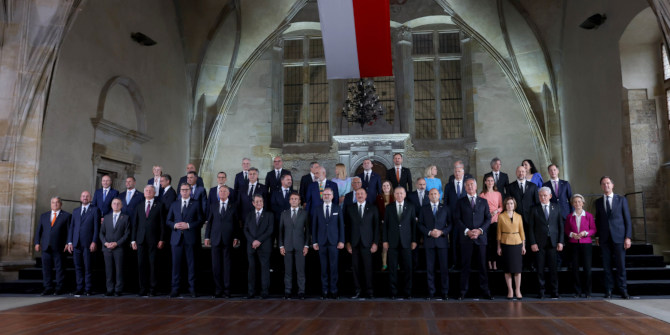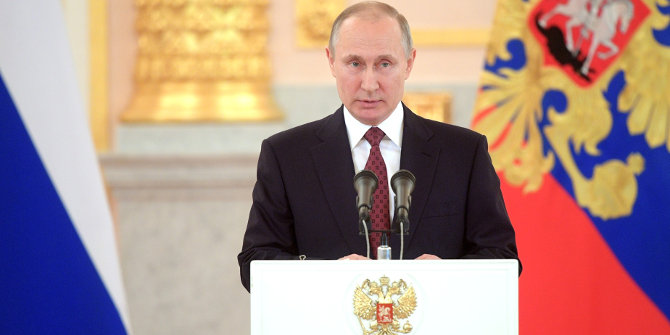The so called ‘One Belt, One Road’ initiative is a plan by China to foster stronger cooperation and connectivity with other countries in Europe and Asia. Andreas Grimmel and Susanne My Giang shed light on the fact that the initiative has the potential to unlock a new kind of integration that focuses not only on bringing states within regions together, but also forging strong links between regions.
Regional integration projects play a central role in international relations. Today, there is barely any region in the world that is not decisively shaped by such integration projects in the fields of politics, law, economics, and society. However, regional integration does not only influence the nation state and its actors, but also the relationship between different regions themselves.
The One Belt, One Road initiative (OBOR) launched by China in 2013 sets a new milestone in this trend of regional integration in three different respects: first, through its ambitious agenda to connect Asia with Europe by a comprehensive trade and infrastructure project; second, its far geographical reach, potentially encompassing up to 65 countries; and third, in that it is a project that aims at both regional and interregional integration from the outset. On this basis, the initiative has the potential to bring about a new type integration: a merger of regionalism and interregionalism that would significantly differ from other integration projects like the EU, the ASEAN, the ECOWAS, or the EAEU.
What is new and most striking about the “Chinese Way”, expressed in Beijing’s OBOR strategy, is first and foremost its economically driven pragmatism that is not limited to a certain narrowly defined region, but is potentially designed to engage in various forms of trans and (hybrid) interregionalism right from the outset. In this respect, at least, the initiative seems to match the global nature of the most pressing challenges – such as financial turmoil, crises of the international markets, resources, environmental issues – more appropriately than regional integration projects, since these that have been established in quite different historical and world-political circumstances.
Moreover, also the rise of nationalist politics and bilateralism and preferential trade agreements also make it necessary to consider the Chinese initiative as an opportunity, since it has the potential to open up perspectives for a more multipolar form of global governance and the return to more liberal regulations and trade relations that avoid the well-known drawbacks of preferential trade agreements.
How should the European Union react?
Beijing’s grand project has been frequently abridged as mainly a chance for China to access new markets for overseas sales or a geopolitical strategy. This view, however, falls short and neglects the many facets of the initiative. And it also overlooks that the initiative can also offer fresh perspectives for the European Union. It should therefore be taken more seriously than it has been so far by EU institutions and member state governments. More concretely, the EU could understand the OBOR as a double chance: first, to take a more active role in shaping international relations again, and second, to work towards a more liberal and multilateral international trade regime and withstand highly protectionist preferential trade arrangements – such as TTIP and other “mega-regionals” – that mark a clear departure from the multilateral approach of the WTO.
In light of the EU’s recent crises and the rather troublesome nature of current transatlantic relations, China’s timing is good to make a convincing case for its project to establish a stronger connection between Asia and Europe. This is particularly the case given China is the second largest trade partner of the EU and the transactions (not only in trade) between the EU and China are constantly rising, and will sooner or later need more sustainable programmes and institutional arrangements to allow for efficient and fair mutual exchange.
So why is the EU still astonishingly reluctant toward engaging with the initiative? And how should it react in light of its current situation? One reason for the EU’s reluctance is that the OBOR strategy is still in its initial development phase and only scarce details are available about how it should work in practice. At the same time, it is obvious that the Chinese government has not only strong feelings about reviving the old Silk Route, but is persistently working towards convincing new partners to participate in the project and to explore options for cooperation. At this agenda setting stage, the EU would benefit from actively engaging with the project to shape it and bring in its own ideas and positions. It could also help clarify important issues such as the concrete legal and political framework the initiative may be based on. Put differently, if the EU wants to shape the OBOR it should not try to swing aboard the driving train, but has to engage in the project right from the beginning.
The answers to these questions are crucial, since it must be remembered that the EU is much more than a trade bloc. It is also a political and legal community that is constituted through a number of institutions and an acquis communautaire that will create demands with regards to the compliance with established standards and norms.
In other words, if China is serious about its ambitious project, it has to adopt a holistic approach to convince their hesitant European partners as the EU will have to maintain its accumulated legislation, legal acts, and judicial decisions, and will want to establish a broader legal, judicial, and maybe even political framework. And the alternative? It will be not much more than “business as usual”, i.e. mere cooperation in trade that already exists between Europe and Asia, and that will not need a far-reaching initiative like the OBOR.
What is necessary to make the One Belt, One Road Initiative work?
If even just a part of the project works out as China envisions, the initiative could have vast positive effects for the Chinese and global economy, and for infrastructural and political developments along the revived silk road economic belt and the maritime silk road in particular. Especially for the decelerating Chinese economy, the OBOR could provide new impetus. However, with regard to the size and scope of the initiative, and the numerous partners involved, a successful realisation will depend on four crucial aspects:
First, the OBOR aims to be a multilateral initiative based on mutual agreements and benefits for all partners. However, it is necessary to formalise these objectives and formulate concrete agreements to make sure this commitment finds its way into the initiative’s future practice. In other words, the OBOR needs a solid legal and political – not just economic and financial – basis. A one-sided approach to developing new markets for China alone will not attract the EU, nor many of the other 65 potential partner countries.
Second, the Chinese initiative is a great chance to stabilise and enhance EU-China trade relations and could function as a gateway for further reforms and deeper political cooperation. The EU should seize this opportunity and enter into a dialogue with China on equal terms. The EU’s willingness to engage with the project, however, will largely depend on the specification in form and content of the OBOR.
Third, and more specifically, although the initiative is primarily based on the idea of eliminating trade barriers and strengthening diverse fields of mutual investment areas, the “rules of the game” must be clarified; and they must be transparent in a way that allows for a critical public debate. The OBOR should not try to be just another preferential arrangement like TTIP or TPP, and it would be well advised to not repeat the same flaws. The broad public protests against such agreements in Europe have clearly shown that large parts of European society are unwilling to accept non-transparent trade policies and lower standards (such as in the field of consumer and environmental protection).
Fourth, and with regards to the size of the project, there will be enormous investment needed. It is envisaged that one part of the financing will be provided by the Asian Infrastructure Investment Bank (AIIB) and the New Development Bank (NDB). But the means provided by these institutions will not be enough. For a realistic implementation of the initiative, other investors are needed. Furthermore, this also means that the projects to be realised must be carefully selected on the basis of their practical and sustainable use, and they must be monitored to avoid money trickling away within large scale projects due to corruption and a lack of transparency.
Making the OBOR initiative a success
The OBOR is meant to be an open, harmonious, inclusive and respectful market driven initiative, which aims to be in line with the UN Charter and to be of mutual benefit for all parties. The initiative outlines policy coordination, facility connectivity, unimpeded trade, financial integration and establishing new bonds between people as its five major priorities. In this ambitious framework, it offers innovative perspectives not only for economic development, but also for deeper cooperation and integration of the OBOR countries. Nevertheless, it is necessary that the initiative will not be reduced to a mere trade agreement, and that it will avoid repeating the flaws of preferential trade agreements. The One Belt, One Road Initiative has the potential to be something new and the first comprehensive interregional project, but China and the EU will have to work together on it to make it a success.
Please read our comments policy before commenting.
Note: This article gives the views of the authors, and not the position of EUROPP – European Politics and Policy, nor of the London School of Economics.
_________________________________
 Andreas Grimmel – Universität Hamburg
Andreas Grimmel – Universität Hamburg
Andreas Grimmel is Research Associate and Lecturer at the Institute for Political Science at Universität Hamburg and at the Institute for European Integration, Europa-Kolleg in Hamburg. He currently is a Visiting Scholar at the Fudan Development Institute (FDDI) in Shanghai. His research includes European Union politics and European integration, regional integration, international organizations as well as political theory and philosophy.
 Susanne My Giang – Universität Hamburg
Susanne My Giang – Universität Hamburg
Susanne My Giang is a PhD candidate at Universität Hamburg, Institute for Political Science. She has studied Political Science and Southeast Asia Studies and currently is a Visiting Scholar at the Fudan Development Institute (FDDI) in Shanghai. Her main research fields are energy system transformation as well as environmental and climate policy in Southeast Asia.






You are deluded to think that China will do anything other than act in its own interest. This is a straightforward ‘scam’ of a magnitude which is unbelievable. China is a country with less than zero respect for its citizens well-being, has no interest in coming into line for Human Rights, is a duplicitous, corrupt (and corrupting region), has no common rule of law other than that decreed by the CCP. Is in all likelihood the puppet master for the despicable N.Korean dictator ‘Fat Boy’. The day they respect the IPR of others is, I am afraid, never going to happen until they have a revolution to get rid of the rotten ‘head of State’ the CCP.
How the EU could even consider dealing with these people is a mystery to me. How do you defend such thoughts let alone actions, China is diametrically the opposite of what the EU professes to stand for.
This is scary, really scary !! Who will benefit most .. China or the rest of the countries involved ?
You can be sure it will be China and the first step to take over world trade so that if you need something you will have to go to China. Just look at the world assets they have already purchased and continuing to purchase, the ongoing work in Africa etc etc. Imagine 50 years from now !!!
China has time and money to achieve their long term and secretive agenda!!
Gary